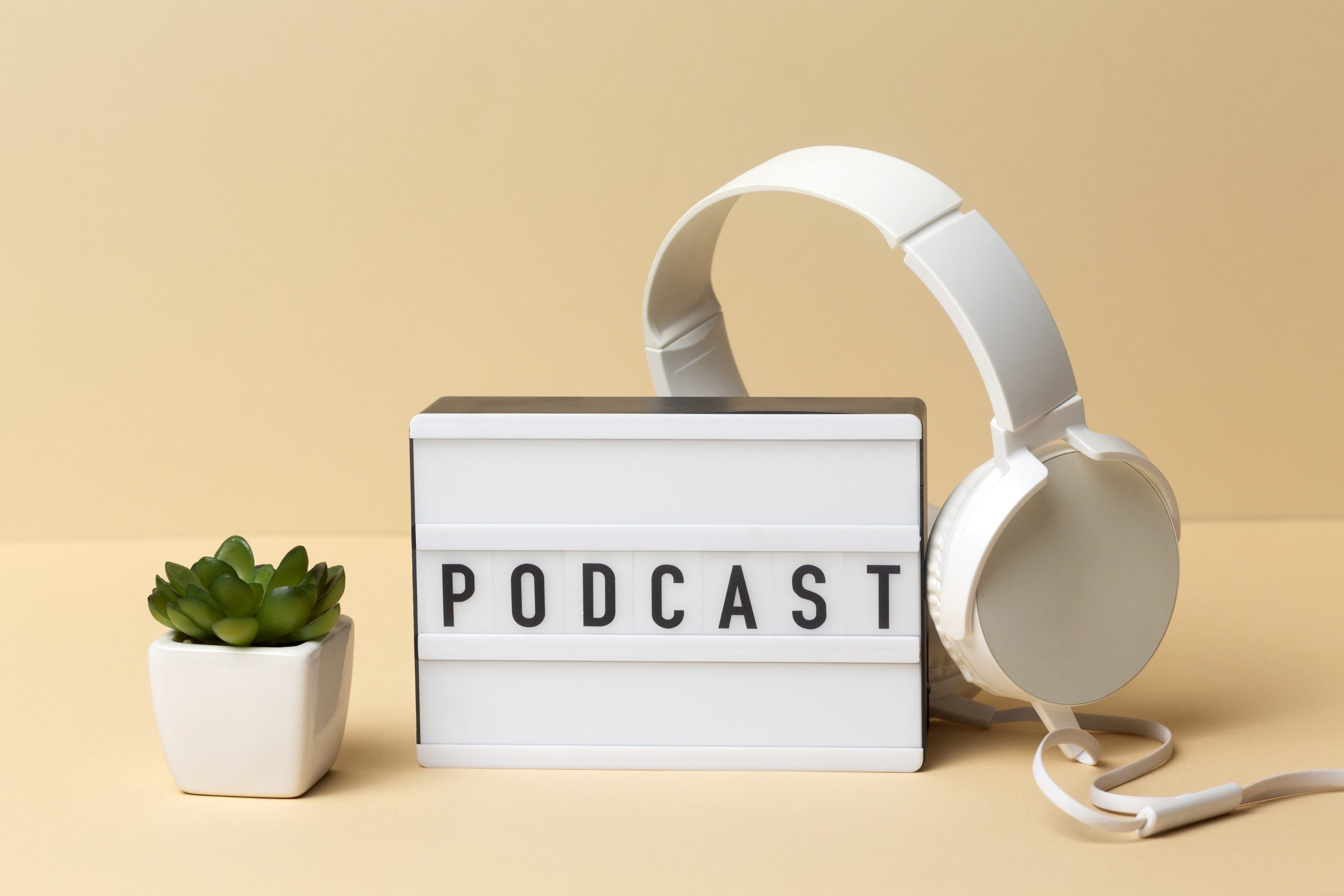6 Smart Ways to Use Podcasting in Education
- Diana Aghumyan
- June 23, 2023
- 10 min read
New technology has a significant impact on education, and podcasting is no exception. Many educational institutions, including schools, colleges, and universities, have started using technology-based learning instead of using old-fashioned textbooks.
Podcasting is becoming one of the most popular methods for acquiring new information. Based on the podcasting statistics from March 2022, 51% of the population has listened to a podcast, and 78% are generally aware of the medium. Besides, 28% of the American population listens to podcasts on a weekly basis.
Since audio medium has such wide popularity, educators consider using it for teaching practices. And if you doubt whether it is worth using podcasting in your teaching process, we’re here to help you decide.
In today’s article, we will walk you through some of the advantages of podcasting in education as well as a few useful tips on how to use podcasts for educational purposes. So, let’s start!
Podcasting in Education: 5 Benefits
Below, you will find some of the benefits of podcasting in education.
1. Listening is More Engaging Than Reading
Nowadays, students use podcasts for learning.
Why?
They prefer to learn via listening rather than reading a long text on the same topic. It is because the information presented in an audio format requires less effort to understand. It’s similar to listening to the lecturer, even though he/she is not present in the classroom.
Apart from that, pre-recorded instructional resources allow students to review the topic as many times as necessary without feeling ashamed in front of their peers. This is especially useful for folks who have trouble following lectures.
2. Podcasting Allows More Flexible Learning
One of the powerful benefits of podcasting in education is that students have freedom when it comes to the learning format. They don’t need to spend hours in the library to get all the necessary information. Instead, students can listen to podcasts while walking or doing other activities.
This option is excellent for students who work and don’t have enough time to devote to their studies. They can listen to podcasts during their work breaks and easily catch up on missed lectures.
3. Podcasts Are Great For Revision
Podcasts are also a great revision tool. You can go over the past material anytime and anywhere. Students can move at their own speed, pausing and repeating sections that require additional time. Being able to review previous lectures anytime they want might be quite beneficial while studying for exams.
4. Podcasts Are Easy to Start
You don’t need pricey video equipment or editing software to create a quality podcast. Interesting podcast ideas for students are the most important thing to have to start podcasting. If you have a little bit of patience and have already decided which podcast format to use, you can easily get started. USB microphones are not expensive. You can plug them straight into your laptop or computer. As long as you have a quiet room, podcasting makes it easier for teachers to work from home.
5. Students Can Catch Up On Missed Classes With Podcasts
It may be unpleasant and demotivating to miss classes. It’s tough to avoid becoming overwhelmed by a growing backlog of work after you’ve fallen behind. This is all too frequent among young people. Therefore it’s critical that students don’t fall behind after missing a few days of school.
Recording a podcast for your course could be one of the best solutions. Instead of being overwhelmed with intimidating textbooks, students could listen to a podcast while commuting or doing something else. This would decrease stress and prevent students from falling into the endless cycle of always lagging behind the classes.
How to Use Podcasting in Education in 6 Effective Ways
1. Using Existing Podcasts During the Classes
There are a bunch of podcasts available, so why not take advantage of them and use podcasts in the classroom? Whether you are a history or English teacher, you can find a podcast on any topic. Podcasts are great learning materials you can use during class. As we have already mentioned, it is easier to listen to podcasts rather than read a bunch of text. Especially if your topic is too complex, it is highly recommended to use podcasts for learning complex topics.
Some podcasts will not only make your subject less overwhelming for students, but they might actually evoke some positive emotions.
2. Teachers Can Turn Lectures Into Podcasts
Many teachers are already incorporating lectures into their teaching methods. So why not record your lecture and deliver it in a more effective way? Post the audio on the internet, and if you want to include a video, do so. It’s all too easy to become distracted during a lecture, especially in the early morning on Monday. Important information may not always reach your students’ minds. So, turning your lectures into podcasts will be a lifesaver for students who didn’t grasp every word the first time.

3. Listening Quizzes
Another great way to use podcasting in education is using podcasts for listening quizzes. This is a great way to assess your student’s ability to listen and understand information. So, you can play a podcast a few times. Then, allow students to demonstrate their understanding by conducting a short quiz.
This way, students can develop their listening skills and receive new information in a more accessible way. Besides, listening is more fun than reading and writing.
4. Students Can Learn How to Conduct Interviews
Practicing interviews is an excellent way for students to learn how to ask the right questions, listen carefully, and improvise when needed. When teachers assign such a task to their students, students should find the right people to interview, conduct an interview, record and edit the recording, and submit the final version.
So, learning how to interview others assumes that each student should

- Choose someone to interview. This could be anyone: a friend, family member, or a person they find interesting to talk to.
- Listen to other podcast interviews. This will allow your students to understand what kinds of questions hosts ask, how they avoid awkward silence, and other useful information.
- Collect enough information about the interviewee.
- Prepare a list of interesting and thought-provoking questions for the interview.
- Conduct and record the interview in a noiseless space.
These tips will help your students better prepare for the interview and ensure that the conversation flows smoothly and naturally.
5. Teachers Can Use Podcasting A Storytelling Tool
Podcasts are an excellent medium for storytelling, and the genre is rapidly expanding. More and more individuals are finding the power of podcasting to create immersive worlds. It’s a well-known saying that tales help people learn, and studies back it up. Everything is simpler to remember when it is part of a story. Turning parts of your lectures into stories is an effective method to boost your student’s academic performance.
You can incorporate storytelling into any subject. Languages and History are simple to turn into compelling stories. The best part is that you can get as creative as you want and come up with unique characters. Converting everything you teach into a memorable story will enable your students to learn more efficiently.
6. Assigning Students to Make Their Own Podcasts
Teachers are constantly seeking fresh projects for their students. Why not assign your students to produce their own podcasts as the next assignment? There are various podcast topic ideas your students can use for their projects. Such assignments encourage active learning, and you can rest assured that everyone clearly understands the topic.
Nowadays, it is highly important to assign students tasks that involve teamwork. Students need other means of social engagement since COVID-19 reduces the possibility of meeting and interacting with new people. Even while studying from home, having students create a podcast in groups ensures that they are developing their interpersonal skills.
Conclusion
As you can see, using podcasting in education is highly beneficial. Listening to podcasts is more fun. It is much easier to listen to audio material rather than read long, dull texts. Besides, students can access podcasts anytime and anywhere. Moreover, even if they skip some classes, they will be able to study the skipped material by listening to podcasts.
The best part about podcasts is that they don’t require huge financial resources. If you have a basic USB microphone, basic editing software, and a laptop, you can easily get started even if you have no experience.
So, if you are a teacher or a lecturer at a university, you should take advantage of podcasts. There are various ways you can incorporate podcasts into your teaching process. We hope the above-mentioned methods will inspire you to come up with your own way to use podcasts in your classroom and keep your students engaged.

SEO Content Writer
Diana Aghumyan
Diana is an experienced creative SEO content writer at SayNine. She is passionate about writing and giving value to people with her articles. Her blogs revolve around advertising, digital marketing, and other similar topics.
